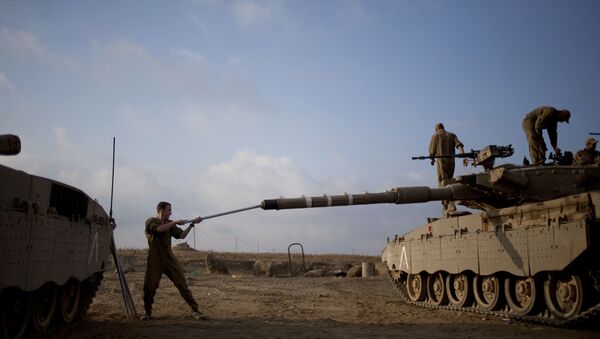Sputnik: What are your thoughts about the plan to expand and develop the Golan Heights?
Gabriel Ben-Dor: I think the Israeli government is using the opportunity to make progress on this front, given that the Syrian civil war is more or less coming to an end, and Israel wants to make a point that its presence in the Golan is permanent.
There seems to be consensus in Israel, even among the relatively restrained part of the population, that the Golan Heights are absolutely essential for Israel's security; that the Syrian regime should not be given a chance to use that as a launching pad for attacks against Israel. So Israel wants to make a point.
Sputnik: Do you think that this will be a successful plan?
Gabriel Ben-Dor: No I don't. I don't think this move is very smart at the moment. I think it is smart from the Israeli point of view to hang on to the Golan Heights for the time being until the situation stabilizes in Syria and until there is some kind of permanent peace settlement that will once and for all bring about an international agreement between Israel, Syria and the international community.
But given that there is no process, and that there is no government in Syria which will negotiate, and given the Iranian presence in Syria, the Israelis are trying to take some unilateral steps which would improve their negotiating position in the future.
I don't think there's going to be much agreement or acceptance of this around the world. I don't think it's going to work very well. But I think it's going to make a point within the Israeli political system.
Sputnik: Would you equate this timing more with the situation in Syria, or with the Trump administration and the stance they've had on Israel?
Gabriel Ben-Dor: Both. Obviously the recognition of the Trump administration of Jerusalem as Israel's capital, and the move of the American embassy there…has created a kind of confidence in Israel which is necessary for making a move on Golan.
Sputnik: What kind of concrete obstacles, and from whom, can we expect on the way to Israel's further development of the Golan Heights or their hanging on to the territory?
Gabriel Ben-Dor: I don't think there's going to be much immediate opposition; there is nobody in his right mind who believes that Israel at this point will return the Golan Heights in the foreseeable future to Syria, which is very unstable, and is very dangerous from the Israeli point of view because it is dominated to a large extent by the Iranians.
So I think there is going to be opposition to legalizing the situation in a permanent way, which is why I think that the Israeli diplomatic move if there is one, is not very smart at this time. But in terms of presence in the field, on the ground, and establishing some kind of Israeli presence on the Golan Heights which will be a buffer zone between Israel and the Syrians in the future, I don't think anybody is going to take permanent steps in order to prevent the Israeli moves which are now being made.
Sputnik: What conditions do you think would have to be in place for Israel to consider returning the Golan Heights to Syria?
Gabriel Ben-Dor: It would be difficult to imagine such conditions. It would have to entail a comprehensive, permanent peace agreement between Israel and Syria supported by the consensus, the mainstream, in the Arab World, as well as Iran, which is an overwhelming force in Syria. These conditions don't seem to prevail at the moment, and I don't think they're going to prevail anytime in the near future.
Sputnik: What part of the world community do you think would actually uphold Israel's claim to the Golan Heights right now if they were to move forward with this plan?
Gabriel Ben-Dor: That depends on the leadership. If the leadership is supported actively by the US administration, as was the case with the Jerusalem embassy business, then there are going to be some other countries which are familiar with this move and which are friendly to the United States, such as several South American countries and such.
But as I've said, even these countries will be very reluctant to grant recognition to a move for annexing the Golan Heights officially to Israel. I think they will somehow tolerate the Israeli presence in the Golan Heights, and will not object, at least vehemently and openly, to what Israel is doing.
Sputnik: It seems that this kind of rhetoric even will increase the tensions between Israel and Syria. Have we seen some kind of reaction from Syria?
Gabriel Ben-Dor: I don't think so. The tensions are there all the time. The Syrians are familiar with the Israeli position, which has been consistent for many years, and I think the Syrians have other pressing business on their hands, and this is the least of their problems. The Syrian regime is trying to stabilize its hold over most of the country, trying to work out its relationship with Iran, with Turkey, the Kurds, and so on and so forth. I think the Golan Heights are not very high on the national agenda, which is one reason why in my opinion Israel should not go ahead with the diplomatic rhetoric which might in the future indeed inflame the situation even more. It's completely unnecessary.
Israel occupied the Golan Heights from Syria during the Six Day War of 1967, annexing it in 1981. The UN Security Council passed a resolution stating that the annexation was "null and void and without international legal effect." Israel insists however that the move was justified and aimed at safeguarding the country from Syrian aggression. In 2016, Israeli Prime Minister Netanyahu vowed that Tel Aviv would "never" return the Golan Heights to Damascus.
Dr Gabriel Ben-Dor is the head of national security studies programs at the University of Haifa. Dr Ben-Dor's views and opinions are those of the speaker and do not necessarily reflect those of Sputnik.




